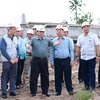The Communist Party of Vietnam (CPV) and the Communist Party of Cuba (CPC) shared their experiences in national development in the new era during their first theoretical workshop in Hanoi on November 5-6.
The Vietnamese delegation was led by the Secretary of the CPV’s Central Committee and Deputy Chairwoman of the National Assembly, Nguyen Thi Kim Ngan, while the Cuban delegation was headed by the Secretary of the CPC’s Central Committee and head of its International Relations Department Jose Ramon Balaguer.
After two days of debate, both delegations agreed that the renewal process in Vietnam and the updated socio-economic development model used in Cuba are long-term strategic policies, not temporary solutions.
This is a complicated task, posing a large number of both theoretical and practical issues, they said, stressing that the sound leadership of the communist party is the prerequisite and the decisive factor to ensuring success.
Both parties analysed each other’s experiences in modernising policies and implementing practical measures, as well as pin pointing the difficulties and challenges they face on the road to national development.
The participants underlined the need to protect, apply and develop creatively the Marxism-Leninism in each country while continuously renovating and improving the capacity of the leadership, consolidating the revolutionary nature of both Parties and strengthening the close links between both Parties and both peoples.
It is essential to promote solidarity, cooperation and experience exchange between the two Parties for the benefit of both peoples and for building socialism in the two countries, they said.
Both parties praised their first theoretical workshop, saying that it provided an excellent opportunity for theorists and activists from both Parties to discuss theoretical issues on building socialism as well as issues emerging from development issues in each country.
The outcomes of the workshop will help nurture socialism in each country, they said, adding that it is also a practical and effective way of deepening relations between both Parties and both countries and that should be maintained in the future.
According to Tran Dac Loi, Deputy Director of the CPV’s Central Committee’s Commission for External Relations, renewal in Vietnam and updating the socio-economic development in Cuba are the results of creativeness in each party when seeking out new ways of advancing towards socialism.
“There has been no precedent in this process, so we have had to address many theoretical and practical issues, particularly in the current international situation,” he said.
As both fraternal parties have the same goal of building a socialist country, both nations need to exchange theoretical research and experiences, he added.
After the workshop, the Cuban delegation will meet with representatives from the Ho Chi Minh National Academy of Politics and Public Administration and later visit central Da Nang city and Quang Nam province.-VNA
The Vietnamese delegation was led by the Secretary of the CPV’s Central Committee and Deputy Chairwoman of the National Assembly, Nguyen Thi Kim Ngan, while the Cuban delegation was headed by the Secretary of the CPC’s Central Committee and head of its International Relations Department Jose Ramon Balaguer.
After two days of debate, both delegations agreed that the renewal process in Vietnam and the updated socio-economic development model used in Cuba are long-term strategic policies, not temporary solutions.
This is a complicated task, posing a large number of both theoretical and practical issues, they said, stressing that the sound leadership of the communist party is the prerequisite and the decisive factor to ensuring success.
Both parties analysed each other’s experiences in modernising policies and implementing practical measures, as well as pin pointing the difficulties and challenges they face on the road to national development.
The participants underlined the need to protect, apply and develop creatively the Marxism-Leninism in each country while continuously renovating and improving the capacity of the leadership, consolidating the revolutionary nature of both Parties and strengthening the close links between both Parties and both peoples.
It is essential to promote solidarity, cooperation and experience exchange between the two Parties for the benefit of both peoples and for building socialism in the two countries, they said.
Both parties praised their first theoretical workshop, saying that it provided an excellent opportunity for theorists and activists from both Parties to discuss theoretical issues on building socialism as well as issues emerging from development issues in each country.
The outcomes of the workshop will help nurture socialism in each country, they said, adding that it is also a practical and effective way of deepening relations between both Parties and both countries and that should be maintained in the future.
According to Tran Dac Loi, Deputy Director of the CPV’s Central Committee’s Commission for External Relations, renewal in Vietnam and updating the socio-economic development in Cuba are the results of creativeness in each party when seeking out new ways of advancing towards socialism.
“There has been no precedent in this process, so we have had to address many theoretical and practical issues, particularly in the current international situation,” he said.
As both fraternal parties have the same goal of building a socialist country, both nations need to exchange theoretical research and experiences, he added.
After the workshop, the Cuban delegation will meet with representatives from the Ho Chi Minh National Academy of Politics and Public Administration and later visit central Da Nang city and Quang Nam province.-VNA



















